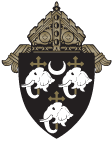In 1967, Pope Paul VI reinstituted the diaconate as a permanent order in the Roman Catholic Church in the document entitled “Sacred Order of the Diaconate” (Permanent deacons had continued in existence in the Eastern Rite). The permanent diaconate is open to both married and single men who qualify for acceptance under canon law and diocesan statutes. The wives of aspirants for the diaconate must consent to their entering the program and are consulted at each major stage to ordination. Those men who are not married at ordination must remain celibate.
If a married deacon’s wife dies, he may not marry again without the permission of the Holy Father: e.g., a deacon in a mission territory left to raise small children by himself. Recently, the US Conference of Catholic Bishops has issued a National Directory for the Formation, Ministry, and Life of Permanent Deacons to ensure consistency in the training and ministry of deacons throughout the United States. These directives stress that training must be similar to that for the priesthood in Scripture, Theology and pastoral practice. Potential candidates should study in a preparatory program which includes learning various types of prayer, gaining a deeper understanding of vocation to and what the diaconate is and a general introduction to Church teaching.
This is followed by the academic program which must be at least three years in length and includes regularly scheduled spiritual direction and at least a thousand hours of lectures and seminars in Catholic theology, morality, social teaching, canon law, pastoral practice, liturgical praxis, and social and charitable service among other areas of concern. A deacon is permitted to hold elective office but may not be involved in any political party or movement which advocates positions or doctrine contrary to the beliefs and practice of the Catholic Church.
A deacon is ordained for service to the needs of the local Church (diocese) not just for a particular local parish. Upon ordination the bishop assigns the deacon to a particular parish and/or ministry for a specified period of time. At the end of that assignment he is transferred or reassigned according to the needs of the Church at that time. As an ordained cleric of the Church the deacon, as well as the priest, is subject to special laws of the Church and the statutes of the diocese which govern his conduct and ministry.
The future program of formation and education for students for the diaconate in the Diocese of Camden extends for approximately five years.
